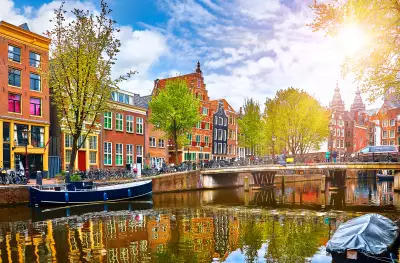Visiting Switzerland: Culture, Etiquette, Currency and More Travel Tips

Planning a trip to Switzerland? Whether you're heading to the mountains, exploring historic cities, or indulging in world-famous cuisine, knowing a few essentials before you go can make your visit smoother and more enjoyable. From understanding the language in Switzerland to knowing what currency to carry and how to navigate cultural etiquette, here’s everything you need to feel confident and prepared.
What's the language in Switzerland
Switzerland is a multilingual country with four official languages. German is spoken by around 60% of the population, particularly in the central and eastern regions, including Zurich and Bern. French is spoken by about 25% of the population, particularly in the west, in cities like Geneva and Lausanne. Italian is spoken in the southern canton of Ticino - which covers about 8% of the population - and Romansh is used in parts of the southeast, only 0.5% of the population speak Romansh.
While a lot of Swiss speak fluent English, It's still helpful to know a few basic phrases.
If you're visiting German-speaking regions:
- Grüezi (GRIT-see) – Hello (used in Swiss German)
- Danke (Dahn-kuh) – Thank you
- Bitte (Bit-eh) – Please / You’re welcome
If you're visiting French-speaking regions
- Bonjour (Bon-jour) - Hello
- Merci (Mare-Sea) - Thank you
- S'il vous plaît (sil vu play) - Please
- De rien (duh ree-EN) - You're welcome
What's the currency in Switzerland?
It may surprise you to know that the currency in Switzerland is the Swiss franc (CHF) and NOT the euro. While some tourist areas - particularly large department stores, souvenir shops and supermarkets in touristy areas - accept euros, it's best to carry francs to avoid poor exchange rates or refusals. Credit and debit cards are widely accepted - check with your bank before you travel - but it's still a great idea to keep some cash on you for smaller purchases at local businesses and tips.
Do I need a visa to travel to Switzerland?
If you are a UK citizen, you can visit Switzerland for up to 90 days in any 180-day period without a visa. However, your passport must be
- Valid for at least 3 months beyond your departure date
- Issued within the last 10 years
For more information, you can check the official government website before you travel to stay up to date on requirements.
What to wear in Switzerland?
Can you wear jeans in Switzerland? Absolutely – Switzerland is stylish but casual. Jeans, trainers, and outdoor clothing are common, especially for travellers. However, if you’re dining in a fine restaurant or visiting cultural venues, smart-casual attire is recommended.

Laws and unspoken rules in Switzerland
A little courtesy and cultural awareness go a long way in making your trip smooth and memorable. Switzerland is particularly well-known for its orderliness and high standard of living - maintained by official laws and unspoken cultural expectations.
Laws tourists should know for holidays to Switzerland:
- Jaywalking (crossing the street at a red light) is illegal, even if there’s no traffic. Swiss police are known to issue on-the-spot fines for jaywalking.
- Switzerland has strict littering and recycling laws. In many areas, you’re required to separate recycling (glass, paper, plastic) and use official rubbish bags. Disposing of waste incorrectly can lead to fines.
- Keep noise to a minimum, especially in “quiet carriages” (marked “Ruhezone”) on trains. Disruption can lead to fines.
Do's and don'ts in Switzerland
Respect and punctuality are key values in Swiss culture. These unspoken rules aren’t legally enforced but are strongly observed and appreciated by locals:
Do:
- Be on time – Swiss people are famously punctual. To them, it's a sign of conscientiousness, diligence, and trust.
- Keep your voice down - speaking loudly in public spaces is considered rude - especially on public transport.
- Greet with a handshake – this is standard in most settings.
- Respect queues and personal space - Pushing ahead or crowding others in a queue is frowned upon.
Don’t:
- Speak loudly in public or on public transport - speaking loudly in public spaces is considered rude - especially on public transport.
- Attempt small talk with strangers - while not unfriendly, Swiss people tend to keep to themselves in public and won't initiate casual conversation with strangers,
- Begin eating until everyone has been served and someone says “En Guete!” (Enjoy your meal). Always use cutlery -eating with your hands, even for things like pizza, is not common.
- Assume everyone speaks English – try to use basic greetings in the local language using the phrases above.
These unspoken Swiss rules reflect a broader cultural emphasis on order and consideration for others.
Do you tip in Switzerland?
Much like in the UK, a Service charge is typically included in restaurant, hotel, and taxi prices, but rounding up the bill or leaving a small tip (5–10%) is customary and appreciated for good service. It’s not considered rude not to tip, but it is a polite gesture when you’ve had a good experience.
Switzerland is a beautiful, welcoming country, but like any destination, understanding local customs will make your trip more enjoyable. From knowing the language in Switzerland to getting familiar with the currency in Switzerland, tipping norms, and cultural etiquette, these tips are designed to help you travel smart.
Want more detailed information? Read more about holidays to Switzerland:
- 10 Best Places to Visit in Switzerland
- When's the best time to visit Switzerland
- Top 10 Things To Do in Switzerland
- Travellers Guide to Food in Switzerland




